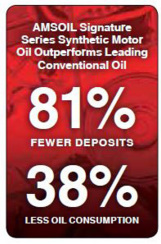INDEPENDENT DEALER
Alexander, North Dakota | (701) 770-2275
Spend Less on Fuel and Motor Oil With AMSOIL
Compared to conventional oils, AMSOIL synthetic motor oils help improve fuel economy while reducing oil consumption, both of which save you money.
The synthetic base oils used to formulate AMSOIL synthetic lubricants are manufactured using a process that produces base oils of a uniform molecular structure. The smooth, pure molecules in AMSOIL synthetic lubricants slip easily over one another, increasing lubricity compared to conventional oils and maximizing fuel economy. They are also inherently more stable in the presence of heat, resulting in less oil consumption.
AMSOIL INC. has conducted industry-standard tests to demonstrate. For example, AMSOIL synthetic diesel oil, transmission fluid and gear oil increased fuel economy 6.54 percent in short- to medium-haul diesel applications in one test, while boosting fuel economy in diesel trucks used in stop-and-go city driving conditions 3.15 percent in a second test. The same synthetic technology extends to the entire line of AMSOIL synthetic lubricants, delivering maximum fuel economy in all your vehicles and equipment.

Likewise, a conventional oil showed 60 percent more oil consumption than AMSOIL 5W-30 Signature Series Synthetic Motor Oil in testing, requiring more frequent top-offs. Conversely, Signature Series showed 38 percent less consumption than the conventional oil.*
It all means you save moneyat the pump and have to top-off your oil less often.
Why Choose AMSOIL Engine Oil and AMSOIL Products?
 AMSOIL synthetic lubricants are chemically engineered to form pure lubricants. They contain no contaminants or molecules that don’t serve a designed purpose. Their versatility and pure, uniform molecular structures impart properties that provide better friction-reduction, optimum fuel efficiency, maximum film strength and extreme-temperature performance conventional lubricants just can’t touch.
AMSOIL synthetic lubricants are chemically engineered to form pure lubricants. They contain no contaminants or molecules that don’t serve a designed purpose. Their versatility and pure, uniform molecular structures impart properties that provide better friction-reduction, optimum fuel efficiency, maximum film strength and extreme-temperature performance conventional lubricants just can’t touch.Conventional lubricants, on the other hand, are refined from crude oil. Contaminating elements such as sulfur, nitrogen, oxygen and metal components such as nickel or vanadium are inherent to crude oil and cannot be completely removed through the refining process. The oil refining process separates the various types of molecules in the oil by weight, leaving molecules similar in weight but dissimilar in structure, reducing performance.
*Supported by the NOACK Volatility Test (ASTM D5800)
Some Products
Advanced Filtration Technologies provides custom lubrication solutions, the best engine oil, car oil, motorcycle oil, lubes, greases and the best products for any type of vehicle in Williston, ND. Advanced Filtration Technologies is also a major distrubitor of filtration products in Williston, ND.
Contact Jeremy Heen for more information on AMSOIL products and filtration products in Alexander, ND.
Call (701)770-2275
or check out our online store!









